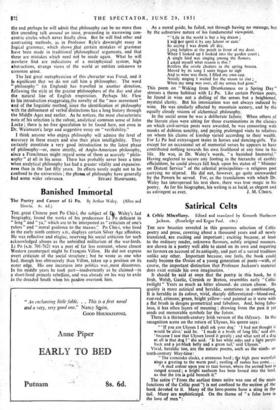Banished Immortal
THE. great Chinese poet Po Chil-i, the subject of L. Waley's last biography, found the works of his predecessor Li Po deficient in " feng " and " ya," which are to be interpreted as "criticism of one's rulers" and "moral guidance to the masses." Po Chii-i, who lived In the early ninth century A.D., displays certain Silver Age affinities. He was reflective and elegiac, reserving his social criticism for such acknowledged abuses as the unbridled militarism of the war-lords. Li Po (a.o. 701-762) was a poet of far less restraint, whose closest Western counterpart might be Francois Villon. He did not express overt criticism of the social structure ; but he wrote as one who had, though less obtrusively than Villon, taken up a position on its outer edge. His one incursion into politics was ,most disastrous. In his middle years he took part—inadvertently as he claimed—in a short-lived princely rebellion, and was already on his way to exile in the dreaded South when his parglOn overtook him. As a moral guide, he failed, not through having no message, but by the subversive nature of his fundamental viewpoint. Life in the world is but a big dream ; I wit' Vot spoil it by any labour or care.' So saying I was drunk all day, Lying helpless at the porch in front of my door. When I looked up I looked into the garden court ; A single bird was singing among the flowers. I asked myself what reason is this? Restless the oriole chatters in the spring breeze. Moved by its song 1 soon began to sigh And as wine was there, I filled my own cup. Noisily singing I waited for the moon to rise ; When my song was over, all my senses had gone."
This poem on "Waking from Drunkenness on a Spring Day" stresses a theme habitual with Li Po. Like certain Persian poets, he found in wine not a dulling of the senses but a heightened, mystieal clarity. But his intoxication was not always induced by wine. He was similarly affected by mountain scenery, and by the equally cloudy visions of alchemical philosophy.
In the social sense he was a deliberate failure. When others of the literate class were sitting for those examinations in the classics on which civil-service posts were awarded, he was consorting with monks of dubious sanctity, and paying prolonged visits to relatives on whom his claims of kinship varied according to their wealth. For Li Po had extravagant tastes in horses and dancing-girls. Yet except for an occasional set of memorial verses he appears to have contributed nothing towards his own livelihood at any time in -his life. He was, in Dr. Waley's words, "a banished Immortal." Having neglected to secure any footing in the hierarchy of earthly officialdom, he could always fall back upon his status of "Minister on Distant Service" of the celestial principalities—a religious post carrying no stipend. He did not, however, go quite unrewarded by the Powers he served. For, as the translations with which Dr. Waley has interspersed his text show, there was true magic in his poetry. As for his biographer, his writing is as lucid, as elegant and


































 Previous page
Previous page